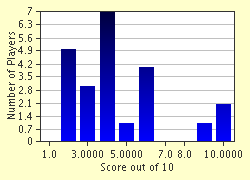Quiz Answer Key and Fun Facts
1. Thomas Jackson's childhood was not a sweet one. The death of a sister and his father before he was five, the fact that he was disliked by his mother's second husband, her death and abuse at the hands of his uncle Isaac Brake were more than enough hardships. Thomas fled from Brake's house after one year with him and went to live with another uncle. Who?
2. After graduating from West Point in 1846, Jackson served in the Mexican War. There he earned fame for his skills in battle and his determination. In one battle, Jackson refused to obey a "bad order" to withdraw his troops and instead he managed to persuade his superior to recall the order. Where did the incident occur?
3. For most of the period between the Mexican War and the Civil War, Jackson served as professor of artillery and math in the Virginia Military Institute. When Virginia seceded, Governor Letcher appointed Jackson a colonel and ordered him to take command of the arsenal at Harpers Ferry. After operating against the Union-held Baltimore and Ohio Railroad, Jackson was promoted to brigadier general on June 17, 1861 and was given command of the Stonewall Brigade. What was the first battle where Jackson commanded the brigade?
4. On July 21, 1861, the First Battle of Manassas (Bull Run) was fought. Thomas Jackson now became Stonewall Jackson. He earned his famous moniker by his gallant stand at Henry Hill, which turned the tide of the battle and secured the Confederate victory. Yet, before Stonewall Jackson's stand, the Confederates had withdrawn from another hill. Which one?
5. The Valley Campaign, fought in the first half of 1862, is one of the most classic campaigns in history. Stonewall Jackson and his approximately 17,000 troops managed to foil the intentions and constantly defeat more than 60,000 US soldiers. During this campaign, several other famous Confederate officers served as Stonewall Jackson's subordinates. Which of the following was NOT among them?
6. About Stonewall Jackson's performance throughout the Seven Days many things have been said. While his performance is considered by some historians to be poor, in fact he had to face many natural obstacles, fatigue on the part of the troops, enemy artillery and lack of familiarity with the terrain. Yet, he was the victim of critics who attributed to him the escape of the Federals and the fact that their army was not destroyed. Which of the following Confederate Generals was NOT a critic of Jackson?
7. The Northern Virginia Campaign, in August 1862, pitted the Army of Northern Virginia under General Robert E. Lee against John Pope's Union army. To suppress Pope, whose harsh attitude against Virginia civilians earned him the moniker "the miscreant", General Lee ordered Stonewall Jackson's Left Wing (later redesignated as Second Corps) to undertake an expedition at the Union rear near Manassas Junction. Stonewall's troops fought a number of actions near Manassas Station, including one against George Taylor's Union brigade. During that skirmish, Stonewall Jackson did something unusual. What?
8. After his victory at the Northern Virginia Campaign, the Army of Northern Virginia under General Lee went into Maryland, thus initiating the Maryland Campaign, which culminated with the Battle of Sharpsburg (Antietam) on September 17, 1862. There, Stonewall Jackson's soldiers were given the task of defending the Confederate left, which includes many famous landmarks of the battle, such as the Dunker Church, the East and West Woods and the Miller Cornfield. In this task, they were helped by an officer under Longstreet, whose performance so impressed Stonewall Jackson that he insisted the young brigadier be promoted to major general. Who was the brigadier?
9. The last of the major battles in 1862 in the Virginia theater of the Civil War, was the Battle of Fredericksburg. Fought between December 11 and 15, with the main action on December 13, General Lee and the Army of Northern Virginia inflicted another staggering defeat on the Federal Army of the Potomac, led by Ambrose Burnside. Stonewall Jackson and his men played a major role in that Confederate triumph. Yet, at one point of the battle, the Federals almost penetrated Stonewall's line, because of a gap in the ranks of A.P. Hill's division. Seeing that, two Confederate divisions rushed to stop them. One was led by Jubal Early, but by whom was the other led?
10. The wisdom of a man is largely revealed to the rest of the world by his sayings and quotes. Stonewall Jackson has left many memorable quotes for us to marvel at. Which of the following quotes was NOT said by Stonewall Jackson?
Source: Author
DeepHistory
This quiz was reviewed by FunTrivia editor
bloomsby before going online.
Any errors found in FunTrivia content are routinely corrected through our feedback system.

